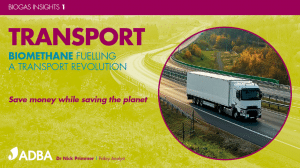On 15 March 2024, ADBA submitted its formal response to the Scottish Government's consultation on…
“Biomethane the key option to decarbonise heavy vehicles immediately” says trade body in new publication
“Biomethane the key option to decarbonise heavy vehicles immediately” says trade body in new publication
- Biomethane: Fuelling a Transport Revolution reviews how the anaerobic digestion and biogas industry can help decarbonise heavier modes of transport, such as trucks and buses, much sooner than electricity or hydrogen.
- The Policy Briefing report by the Anaerobic Digestion and Bioresources Association (ADBA) details the GHG emissions issues facing the UK transport sector and explores the solutions available for heavy goods and public transport vehicles, which alone generate 20% of current emissions per year.
- Rapid deployment of biomethane for HGVs could reduce GHG emissions by 38% over the next 10 years. Current technological barriers to powering heavy vehicles with electricity or hydrogen mean these future fuels could only cut emissions by 6% over the same period.
- Major fleet operators are already making the transition to biomethane trucks and buses.
- Fuelling HGVs with biomethane can cut well-to-wheel emissions by 80% per km driven and greatly improve air quality.
- As well as decarbonising transport, biomethane can boost an entire economic sector, with ROI for hauliers achieved within two years of operation.
 Earlier this month, the Anaerobic Digestion and Bioresources Association (ADBA) launched a Policy Briefing report demonstrating the crucial role biomethane could play in decarbonising transport in the UK in the short-term.
Earlier this month, the Anaerobic Digestion and Bioresources Association (ADBA) launched a Policy Briefing report demonstrating the crucial role biomethane could play in decarbonising transport in the UK in the short-term.
In the first of a series of Policy Briefing Events, the trade body presented Biomethane: Fuelling a Transport Revolution, which analyses the issues facing the UK transport sector and explores the options presented by electric vehicles, hydrogen and biomethane.
The research highlights the value of biomethane in providing a green fuel alternative for heavy good and public transport vehicles – immediately. Trucks and buses currently generate 20% of the UK’s greenhouse gas emissions from transport, which is itself the highest GHG emitting sector in the UK (27%).
 “Transport is the most polluting sector and its GHG emissions levels have not changed over the past decade. “, explains Charlotte Morton, ADBA’s Chief Executive. “Biomethane is ready to be produced, ready to be used, and can decarbonise heavy vehicles transport here and now. At time when the pollution levels exceed WHO guidelines on 97% of UK roads, we can not afford to wait 15-20 years for electricity or hydrogen solutions to become ready.”
“Transport is the most polluting sector and its GHG emissions levels have not changed over the past decade. “, explains Charlotte Morton, ADBA’s Chief Executive. “Biomethane is ready to be produced, ready to be used, and can decarbonise heavy vehicles transport here and now. At time when the pollution levels exceed WHO guidelines on 97% of UK roads, we can not afford to wait 15-20 years for electricity or hydrogen solutions to become ready.”
A 2020 report by Element Energy shows that rapid deployment of biomethane for HGVs would reduce emissions by 38% over 10 years, whilst waiting for hydrogen/electric HGVs to be manufactured would deliver only 6% over the same period.
Biomethane is particularly appropriate for public transport, long-haul logistics and food distribution vehicles. Household names and cities such as ASDA, Royal Mail, Nottingham City Transport and Liverpool City Council are already making the transition for their delivery fleets and buses.
The report reveals that fuelling HGVs with biomethane can cut well-to-wheel emissions by 80% per km driven, compared to diesel, and that the Return On Investment (ROI) for fleet operators is achieved within two years.
“Using biomethane as a transport fuel is an immediate “no regrets” option that not only contributes to significant cuts in GHG emissions from HGVs, but also stimulates continued growth in the UK biomethane sector.” says Philip Fjeld, CEO of CNG-Fuels. “As the refuelling network expands across the UK, biomethane as a transport fuel will become a win-win solution that is available to all hauliers and that continues to reduce the carbon footprint of a sector that has always been seen as very hard to decarbonise“.
With the launch of the CNHi Biomethane tractor and small scale on-site methanation units, agriculture could be the next sector to benefit from the availability of biomethane to reduce its GHG emissions. The biomethane sector is therefore primed to play an increasingly crucial role in helping the UK achieve its Net Zero targets by 2030.
DOWNLOAD THE ADBA POLICY BRIEFING
Biomethane: Fuelling the Transport Revolution
– ENDS –
For further information, contact:
Jocelyne Bia, Senior Communications Consultant
email: Jocelyne.bia@adbioresources.org ; tel: +44 (0)20 3176 0592
Notes to Editors:
- About ADBA
The Anaerobic Digestion and Bioresources Association (ADBA) is the trade association for the UK anaerobic digestion (AD) and biogas industry. ADBA’s vision is to see the full potential of the UK AD industry realised so it can help the UK achieve its emissions targets and other policy goals, creating a truly circular economy. www.adbioresources.org - ADBA Policy Briefings and Events Series
Launched in June 2021, the ADBA Policy Briefings and Events Series provides sector-specific information and analysis, where the latest data and environmental impact assessments are presented in an accessible graphic format, supported by dispatches from the front line – case studies from those actively engaged in developing the sector. Upon publication, Policy Briefings will be presented at online webinars freely accessible to journalists. - Coming soon:
Policy Briefing event – Biomethane and Hydrogen: two gases, one future
21st July 2021 – 10:30-12:30
Please contact Jocelyne Bia for a free media pass to this event.



